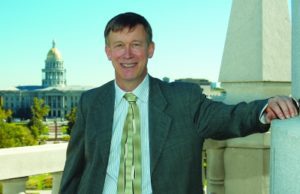Colorado Jewry hardly needs to be introduced to John Hickenlooper, the former state governor and Denver mayor who this week became the latest Democrat to join the field of challengers to President Donald Trump in next year’s presidential election.
For a decade-and-a-half, the self-described “skinny kid with Coke-bottle glasses and a funny last name” has had regular and frequent contact with Colorado and Denver Jews.
A quick check of the Intermountain Jewish News’ cross-reference file brought up his name no less than 62 times, dating back to 2003, when the former restaurateur and brewer first ran for mayor.
Most of those entries covered the usual community honors, testimonials, dinners and menorah lightings – in addition to such landmark occasions as his 2016 signing of Colorado’s anti-BDS legislation and his 2015 visit to Jerusalem’s Western Wall.
A handful of articles, however, went into more depth on Hickenlooper’s attitudes toward Jewish community concerns, including the perennial anti-Semitism and the State of Israel.
We summarize a few such snippets here, as reminders to Colorado readers and as possible indicators of the things the candidate might do and say as his presidential campaign advances.
The IJN’s first coverage of Hickenlooper came in May, 2003, during the newspaper’s Mayoral Forum. Specifically Jewish issues seem not to have played a big role during the debate between several candidates, unlike what is virtually sure to happen during the upcoming presidential campaign.
Hickenlooper, as one of the Lodo district’s first successful businessmen, was asked about historical preservation versus urban development, and said that “trying to maintain a neighborhood as a museum is a mistake,” while advising that architectural integrity should be taken into account in historical neighborhoods.
An exit poll among attendees at the forum suggested that Denver Jews were not ahead of that year’s political curve. Hickenlooper came in third, with 20% of the votes, behind the evening’s winner, Don Mares, with 30%, and Penfield Tate with 21%. (Tate is running for mayor again in 2019, and is a confirmed participant in the IJN’s next mayoral forum on April 30).
During that same campaign, Hickenlooper was challenged by Jews and others when it was disclosed that the Chinook Fund, which he founded, had made a grant to the Colorado Campaign for Middle East Peace, an organization that some Denver Jews believed was anti-Semitic, or at least anti-Zionist.
Hickenlooper told the IJN that he had no control or knowledge of the fund’s granting procedures and that the grant did not signify his personal support for the activist group or its attitudes toward the Middle East conflict.
“I wrote a book report on Israel in the third grade that left a big impression on me,” he wrote in a letter to the IJN.
“Israel is an inextinguishable beacon of democracy within a troubled region, an important US ally and the spiritual home of the Jewish people.”
After Hickenlooper secured the Denver mayoralty, he sat for a lengthy and wide-ranging interview in 2005 with the IJN in his office at the City and County Building.
Among the plethora of issues he discussed during the interview was his view on diversity, sure to be among the top issues he’ll be obliged to discuss as a presidential candidate.
He was speaking in the context of serious contentions between Denver’s Italian and Native American communities during the previous year’s Columbus Day parade, but characterized that divisiveness as the exception to the rule in Denver.
“We are by many measures one of the more diverse cities in the country,” he said of Denver, “growing more diverse all the time, and one of the more harmonious in terms of how we live together.”
In 2011, when Denver’s sister city in Israel, Karmiel, came under intense rocket attacks from Hezbollah in Lebanon, Hickenlooper was quick to reach out to that city’s mayor and citizens.
Offering his “prayers for the safety of our sister city,” the mayor said, “It is hard for me to imagine the nightmare that you, your fellow mayors and your communities are currently facing.”
Closer to home, a spate of anti-Semitic incidents in Denver and surrounding communities in the late winter of 2017 caused Hickenlooper to address the issue of anti-Semitism with the IJN.
“A threat to harm any individual, regardless of one’s faith, needs to be taken seriously,” the then-governor said.
“The recent threats and attacks aimed at our Jewish neighbors and institutions are of great concern,” Hickenlooper said.
“It’s a call for all of us to be vigilant, report any threat or concern, and above all, watch out for and take care of one another.”
Less than two years later, the murder of 11 Jews in a mass shooting in Pittsburgh’s Tree of Life synagogue forced Hickenlooper to speak of anti-Semitism yet again, and in a much darker framework.
Speaking before some 3,000 people at a memorial ceremony at Temple Emanuel in late October, 2018, the governor pleaded with his listeners: “Do not become numb. Do not become apathetic toward this trend of hatred and violence that we have seen in our mosques, Christian sanctuaries and now in our synagogues.
“Any time the safety and sanctity of a faith community is violated, the ripple effects transcend the boundaries of religious doctrine, race and culture.”
Chris Leppek may be reached at [email protected].
Copyright © 2019 by the Intermountain Jewish News

















